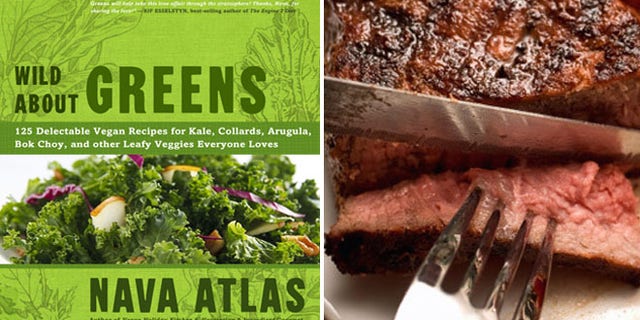Fox News Whaats in Your Beef

NEWYou can now heed to Flim-flam News manufactures!
Kelly and Rick Mooney are gorging University of Oregon tailgaters.
Kelly brother "Mad Domestic dog" wrestled in that location, and back in the day both the Cowboys and the Redskins drafted her dad, Duck guard, "Big Guy" Maloney. Kelly didn't do sports, merely she did practise brew. She was U of O Beer Bell Champion, 1986.
Rick heli-skis and races cars, equally did his oil-and-gas entrepreneur dad. Kelly and Rick have an aviation-obsessed, football-playing son, a become-cart racing daughter and two ambrosial dogs. They besides happen to be vegans.
The popularity of eating vegan -- no meat, fish, dairy, eggs, dearest -- has exploded in contempo years. According to a new Gallup poll 2 percent of Americans say they are vegans, eschewing all products made with and from animals, even bees.
Celebrities and politicos, such as Anne Hathaway, Bill Clinton and Michelle Pfeiffer proudly hash out their plant-based dietary habits, and veganism has even spread into space, every bit NASA scientists work on a vegan menu for the astronauts who volition blast off to Mars on a trip planned for 2030.
But as the popularity of veganism grows, some warn of the faddish hype of veganism, adding that their public prototype is militant as they preach the sins of consuming animals and their past-products for commercial, dietary or environmental reasons.
As more Americans switch to veganism, determining its benefits --both in terms of health and taste --can be confusing.
We talked to 4 experts who weighed in on the pros and cons.
Well, they're not switching for sense of taste, says Nina Planck, who similar the meat and poultry she devours, was farm-raised. "Vegan nutrient is lousy," says Planck, writer of the popular Real Food (Bloomsbury United states) cookbook series. "They take bad taste in nutrient."
She says veganism is well-nigh replacing what'due south at "the center of plate" with substitutions "like soy turkey" or "soy cheese." Plus, she says, vegans annoyingly "tweak worldwide classics, like pesto." They'll use "raw spinach, raw cashews and canola oil" instead of the Parmesan, basil, pine nuts and olive oil of traditional pesto. "Why?" she asks.
Wild About Greens (Sterling) writer Nava Atlas acknowledges vegan meat and dairy substitutes, but points out that veganism embraces meat-free elements from many cultures. She points to Italian pasta, Eye Eastern hummus and Southwestern rice, beans and tortillas. "At that place's an integrity to vegan cooking that doesn't require substitutes."
Vegans get protein from quinoa, a South American grain, tofu, soy and almond milks, beans, peas, nuts, lentils and whole grains. Learning to melt with them "expands your whole culinary palate," she says, proving that plant-based cooking is more than than "a narrow path of vegetable and starches."
Planck'southward beef with veganism goes beyond gustation. It doesn't practise a body adept, she argues. Especially at central stages of life "including, fertility, breast feeding and infant development, veganism is harmful to wellness," she says.
Grains and vegetable oils (corn, soybean, canola) are our main sources of omega-6s, says Planck. Too much omega-6 tin ignite the inflammatory conditions that contribute to cancer, eye disease and diabetes. Veganism excludes omega-3 (from fish), B-12 (from meat) and vitamin D (from dairy) says Planck, and "doesn't sustain skilful wellness over the long run without synthetics."
"That'due south a complete myth," says vegan nutritionist Julieanna Hever, author of The Complete Idiot's Guide to Plant-Based Diet (Alpha Penguin). Yes, vegan diets lack natural B-12, she says, but there are as many poor omnivorous diets as vegan ones. Flax and walnuts provide omega-3s, she says, and fortified soy and almond milks, and cereals, supply D.
Meat'southward vital nutrients come with steroids, hormones, antibiotics and pesticides. "Yous tin can't change that," says Hever. "That animate being spent its life eating those things," she says. Don't eat the brute and you avoid the health issues eating the animal causes: obesity, high-blood pressure, etc.
Explaining that she'd take to pry a burger-and-shake out of her cold, dead hands, Hever good-naturely says that'southward okay as long as her diet is "ninety-per centum constitute-based."
Vegans' "practise no harm" animal credo, which doesn't distinguish between animals equally pets and animals as commodities, does convince some omnivores to switch teams.
Will Harris III isn't buying it. Animals are sacrificed "for purpose of giving nutrition to people," says Harris, 4th-generation owner of Bluffton, Georgia's White Oak Pastures, the simply American subcontract with its own USDA-inspected red meat and poultry slaughter plants.
He understands that some people can't become past the idea that animals can be raised and humanely slaughtered. "We evolved, or were created, to swallow meat," he says. He says we have teeth for vehement and "our eyes are mounted in front similar predators, not the side, like prey."
Harris acknowledges studies showing that meat consumption contributes to cancer and cardiovascular disease. "I defer to the science," he says, but says those studies are based on industrially-raised livestock.
They're based on industrial animals eating corn and soy and "dying of obesity and inactivity," he says. Studies show that organic, costless-range, grass-fed animals like Harris' comprise B and C vitamins, beta-carotene, amino acids, omega-3s and are lower in fat. "All the work that shows that meat is bad for you isn't washed with the kind of meat I raise," he says simply.
Vegan diets with their compassionate opinion towards animals are gaining traction. Convert Kelly Mooney is holding fast for at present. Based largely on veganism's empathetic opinion towards beer.
Source: https://www.foxnews.com/food-drink/whats-the-beef-about-eating-vegan
0 Response to "Fox News Whaats in Your Beef"
Post a Comment